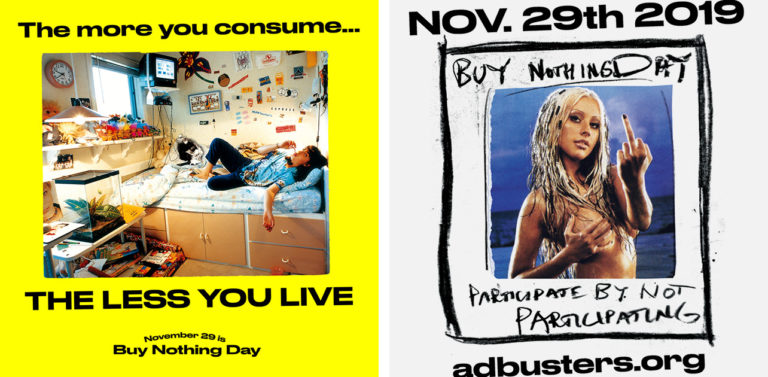Black Friday is almost here, and even in the midst of a pandemic, it remains the biggest shopping day of the year. Already, online sales are surging, with many retailers offering extended promotions to tempt consumers still in lockdown. The environmental impact of this festival of consumption is enormous, with up to 80 percent of items set to end up in landfill, incineration or low-quality recycling after a very short lifespan. Fortunately, opting out is possible — and increasingly appealing. Below, we’ve pulled together a few sustainable tips and tricks to help you cut down on spending (and waste) this holiday season.
1. JUST DON’T DO IT
The most straightforward way for citizens to boycott Black Friday — to buy less, or nothing at all – is perhaps also the trickiest. Because it’s one thing to forgo your Christmas presents for a year, but another thing entirely to unlearn the behaviours and value systems that make us desire more stuff in the first place.
One creative campaign working to break us out of our misery, is Ungifted. Launched by Do the Green Thing in 2017, the project aims to provide “a free-to-use global alternative to the billions of unwanted presents that people send each other every Christmas.” The call to action is simple and joyful: give your loved ones your time instead of more stuff. To facilitate this exchange, Ungifted created a website, where users can personalise and send Ungift cards. The cards are anti-consumption Mad Libs, which users can fill in sincerely, playfully or any which way they please.

Ungifted campaign & platform.
If you’re looking for a community full of resources about similar initiatives, check out #BuyNothingDay. Founded in Canada, Buy Nothing Day is an international day of protest, which challenges participants to stop consuming for just 24 hours. “The dopamine rush of not having, but wanting, and then acquiring stuff is today more powerful, and more commonly and deeply embedded than ever before,” explains Adbusters, who created a campaign for the movement last year. Everyone should try it, they say, to “discover how incredibly hard it is… how deeply ingrained and compulsive your buying habits are.”

Adbusters, 2019.
2. RENT IT
Now, if you really want or need something new, why not borrow it? Many of us are starting to remember that buying and owning products isn’t the only way to run an economy. Apps like Peerby (Netherlands) and Gaifong (Hong Kong) are spearheading a return to more communal ways of living, letting people rent the things they need — tools, electronics, furniture — from neighbours and friends in the vicinity. Even in the fashion industry, which is notorious for its obsession with speed and novelty, online rental platforms like Hurr (UK), Style Rotate (South Africa) and Lena (Netherlands) are gaining popularity. Our tips for first-time renters? Start small and stay local.
It’s also worth noting that a few giant retailers are opting to exchange rather than sell products this Black Friday. This includes IKEA Canada, who have started buying back their own gently-used products from customers, in exchange for store credit. In the Netherlands, they’re amping up the ante by offering double the value for all items returned between 24 November and 3 December. Both programmes were launched as part of IKEA’s commitment to become fully circular by 2030.
Elsewhere, FREITAG, a brand beloved for their range of recycled messenger bags, have launched a Tinder-style exchange platform called SWAP. Here, old products can find new homes within the global FREITAG community. To keep the focus on sharing over shopping, the company will also close their online store for the entirety of Black Friday.


See anything you like? FREITAG bags on exchange.
3. REPAIR IT
Today, it’s often easier — and cheaper — to replace things rather than repair them. Luckily, there are creative enterprises out there working overtime to add new value to age-old practices. Check out Comas, for example, a Brazilian fashion initiative who are currently sharing upcycling techniques through online courses and mentorships. There’s also Reture and Black Fridye, two start-ups offering various refurbishment and redecorating options to help extend the life of your favourite garments. The former connects you to a world-class fashion designer who will give your clothing new life, while the latter makes it easy to redye any old or discolored piece you own.

At Comas São Paulo, old clothes are precious new material.
Also worth a mention is Make Something Week: a DIY festival running all week to celebrate the art of making and mending things as opposed to buying and trashing products. Give it a try if you’re looking to share resources about things like zero-waste living, urban farming or digital makerism.
4. IF YOU HAVE TO DO IT, DO IT BETTER
Most of us can’t avoid shopping forever, and so we’d like to end on a simple note: if you must buy, buy mindfully. On (and beyond) Black Friday, check hashtags like #greenfriday, #lovedclotheslast and #shopethicalinstead for a list of small businesses committed to being more circular and sustainable. If you’re looking for some offline options, visit some of the world’s first recycling malls like Retuna (Sweden), B-Warenhaus (Berlin) and D&Department Store (Japan). The impact of buying from these alternative sources may be small, but it’s also immediate. And if we believe in anything, it’s that wicked problems need to be attacked from many angles.


D&Department also offer workshops and tours to reconnect people with traditional practices like food preservation, woodworking, farming and restoration.
Do you have more tips to add to this list? We’d love to hear them — share them in the comments.
Top image: Buy Nothing Day promotion. Adbusters, 2019.
